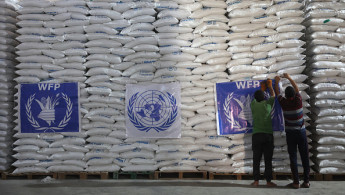Syria extends UN aid deliveries via two Turkish crossings until Nov. 13
Syria has extended its permission for the United Nations to deliver humanitarian aid via two Turkish border crossings until 13 November, the U.N. Office for the Coordination of Humanitarian Affairs spokesperson said on Tuesday.
"We greatly welcome the extension of permission by the Government of Syria to utilise the Bab al-Salam and Al Ra'ee border crossings until November 13th," Eri Kaneko said.
After an earthquake killed more than 50,000 people in Turkey and Syria in February, Syria allowed the United Nations to use those two border crossings from Turkey to dispatch aid. The approval was due to expire on 13 August.
The United Nations had also been using the Bab al-Hawa crossing from Turkey to deliver aid to millions in northwest Syria since 2014 with authourisation from the U.N. Security Council. But that expired in mid-July after the 15-member body could not reach an agreement to extend it.
"Assad, his regime, and its supporters likely view recent political shifts pertaining to Damascus's legitimacy – notably Turkish negotiations and Arab re-normalisation efforts – as presenting the opportune time to press for more leverage." https://t.co/OfBkpvnMyB
— The New Arab (@The_NewArab) July 29, 2023
Just days later the Syrian regime said the United Nations could continue using the Bab al-Hawa crossing for another six months, but those aid deliveries are yet to resume because the U.N. has concerns with "two unacceptable conditions."
The same conditions have not been imposed on the U.N. use of the Bab al-Salam and Al Ra'ee border crossings.
Syrians who fled President Bashar al-Assad's rule fear he may soon be able to choke off badly needed aid as Damascus acts to establish sway over U.N. assistance into the rebel-held northwest, the last major bastion of the Syrian opposition.
A violent crackdown by Assad on peaceful pro-democracy protesters in 2011 led to a civil war, with Moscow backing Assad and Washington supporting the opposition. Millions of people fled Syria with millions more internally displaced. Fighting has since abated with Assad back in control of most of Syria.
(Reuters)





 Follow the Middle East's top stories in English at The New Arab on Google News
Follow the Middle East's top stories in English at The New Arab on Google News


